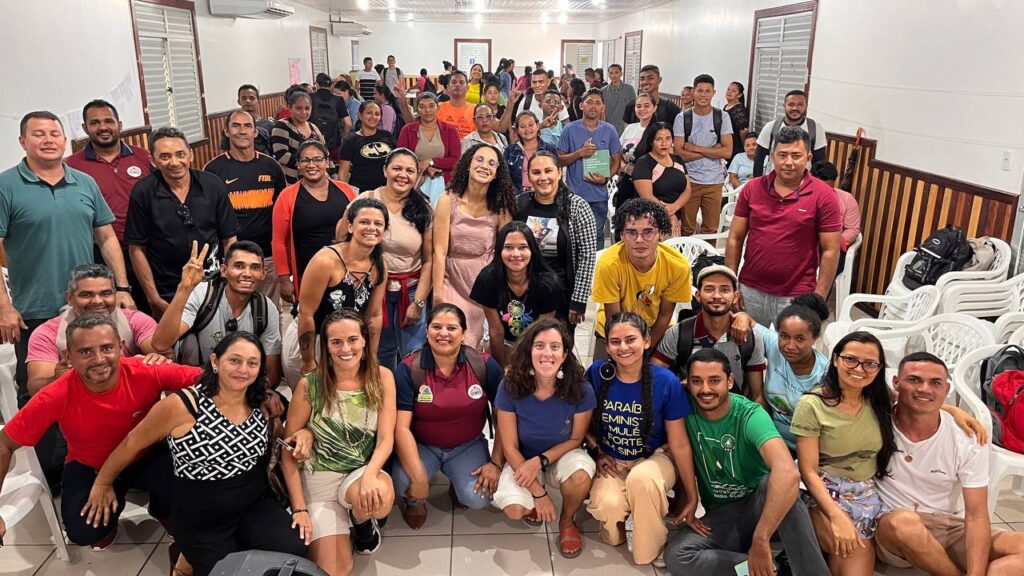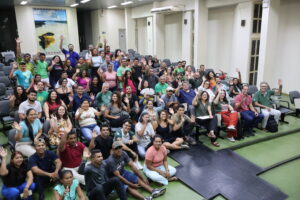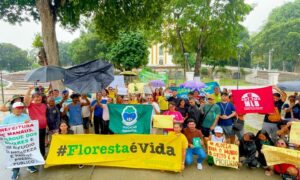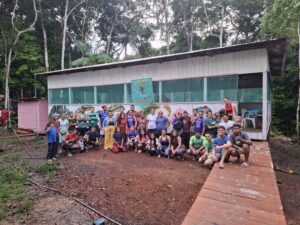The course was offered to encourage the inclusion of these topics in community schools and involve new generations in the continued fight for rights and quality of life.
By Clara Machado
Translated by Bruna Favaro
The course “The school as a trainer of young conservationists”, offered by Instituto Juruá, led local leaders and representatives of associations from Mid-Juruá to dialogue with active and in-training rural teachers in the region between February 26th and 28th, at the headquarters of the municipality of Carauari (located in the State of Amazonas). The course was created based on a demand from Mid-Juruá Territory Forum (TMJ Forum), which highlighted the need for future generations to continue the struggle promoted by socio-environmental movements in Mid-Juruá. These movements have subsidized the construction of successful community-based conservation models, both to guarantee improved quality of life for local populations and for environmental conservation in the Amazon. However, these are still rarely discussed topics in schools in traditional communities.
The goal of the course was to offer a training space to share, in a systematic way, knowledge about community-based conservation. This knowledge has been accumulated over years of fight and organization by the socio-environmental movement in the Mid-Juruá territory. The course also aimed to introduce the development of school projects and provide community teachers with teaching materials that help them in their continued training and teaching practice.
In total, 65 rural teachers from the municipality of Carauari participated in the course, in addition to 34 students from the Rural Pedagogy course at the State University of Amazonas (UEA). The event was organized by Instituto Juruá, in partnership with the Department of Education of the Municipality of Carauari and UEA, with support from Pulitzer Center and International Conservation Fund of Canada.

On the first day of the course, some didactic materials to be used in the classroom were presented, such as the animation Turma do Juruá and the podcast Vozes do Juruá, as well as materials for the continued training of teachers, such as the reissue of the book Reserva Extrativista: Mais vida neste chão, which tells the story of the struggles in the territory; and the book Pedagogia do campo: As vozes do Médio Juruá – developed by students of the UEA Countryside Pedagogy course – which tells the stories of some communities of the region.
On the second day of the course, the main themes were community-based conservation and the history of the social struggle in Mid-Juruá. The panelson this day were composed of leaders and representatives of associations – the protagonists of this movement. They presented the importance of their work to teachers and gave tips on how to work on these issues in the classroom.
Also on the second day, there were panels with the theme “Education,” which offered an overview of education in the municipality of Carauari, based on the themes of indigenous education, rural education and special education. In addition, there was a panel on how to engage future generations in social movements.
At the end of the course, there was a training course in Project Development, and groups of teachers and Rural Pedagogy students were formed, aiming to create school projects in education, bringing to light the themes covered during the course. There will also be an online meeting with Instituto Juruá’s team to support the writing of projects and a final online meeting to present the projects developed by the groups.
At the event, all topics were covered by invited specialists and local representatives. Among the guests who made this training course possible were: Manoel Cunha, important local leader and current manager of Médio Juruá Extractive Reserve (RESEX Médio Juruá); Gilmar Leite, from the Municipal Department of Education; José Alves (Silas), from Association of Agroextractivist Residents of Baixo Médio Juruá (AMAB); Roberto Cury, from Association of Agroextractivist Residents of the Uacari Sustainable Development Reserve (AMARU); Seu Bomba, former chelonian monitor from Juruá; Francisco Pinto (Chico Velho), from Mixed Cooperative for Sustainable Development and Solidarity Economy of Médio Juruá (CODAEMJ); Ahe Joabs Kanamari, coordinator of indigenous education in Carauari; Jucileide Alves, coordinator of special education in Carauari; Rosângela Cunha, from Association of Agroextractivist Women of Médio Juruá (ASMAMJ); Maria Cunha and Marcos Cunha, from Jovens Lutando pela Caminhada (JLPC) collective; Maria José, research student at UEA; and Raimundo Nonato, president of Association of Extractive Residents of the São Raimundo Community (AMECSARA).






